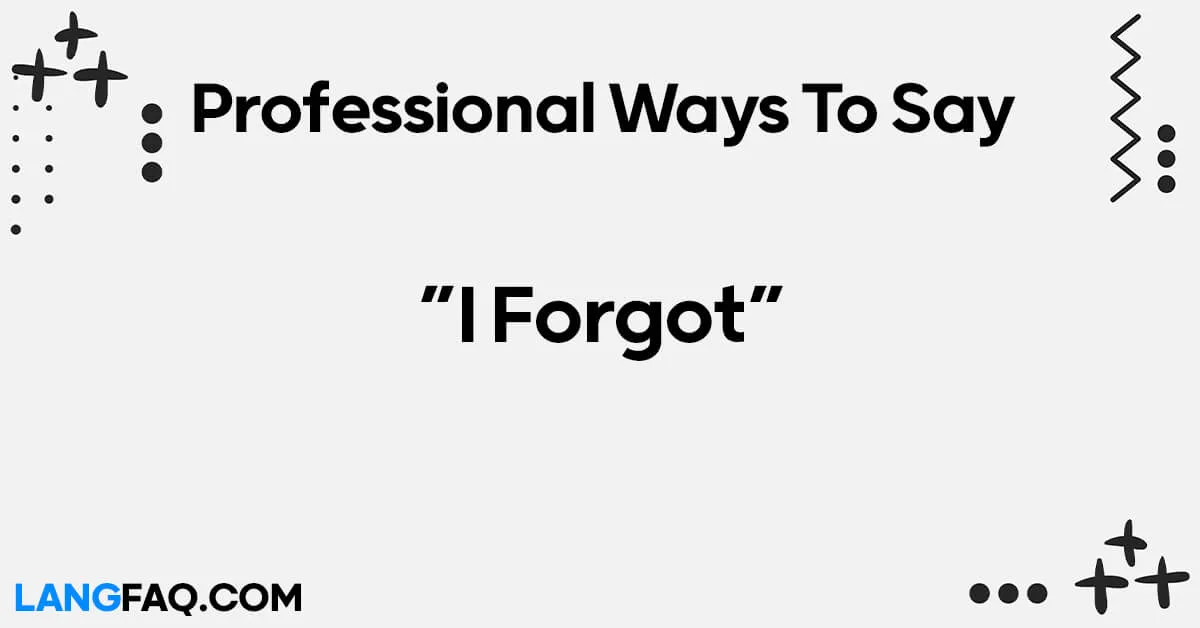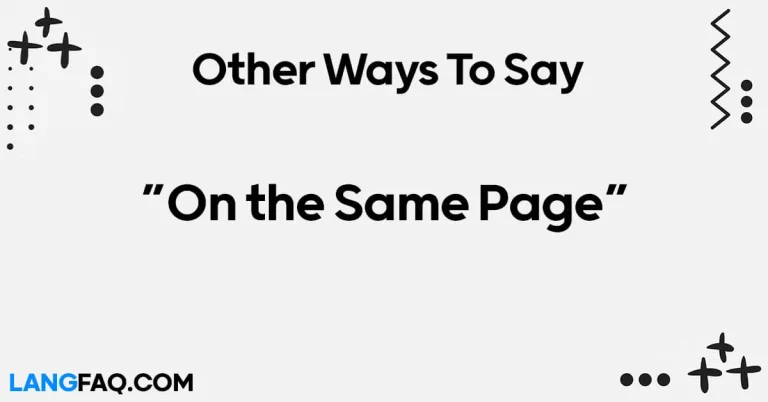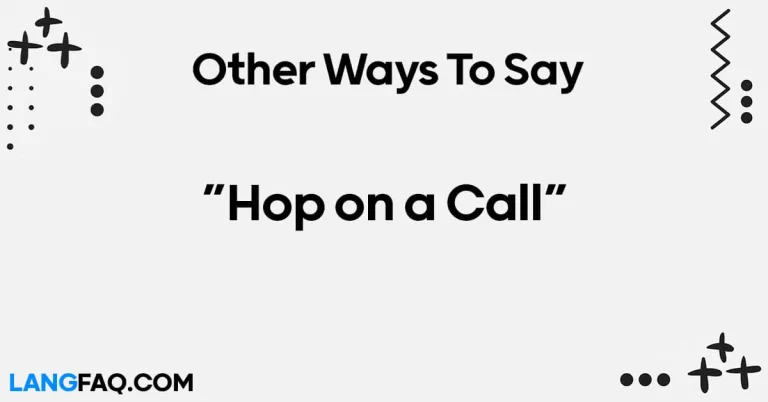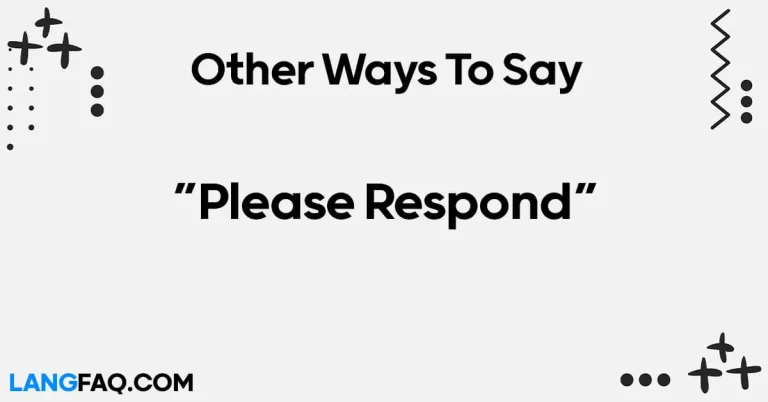In the fast-paced world we live in, moments of forgetfulness are inevitable. Whether at work, social gatherings, or daily interactions, expressing that you forgot something requires finesse. In this comprehensive guide, we delve into 12 professional ways to say “I Forgot,” providing insights, strategies, and a touch of humor to navigate forgetful moments with grace.
12 Professional Ways to Say “I Forgot”
Here are 12 professional ways to say “I Forgot”:
- Memory Lapse Moment: Acknowledge the forgetful moment with a touch of humor, attributing it to a temporary memory lapse.
- Momentary Oversight: Communicate the lapse as a brief oversight, emphasizing the transient nature of the forgetfulness.
- Brief Amnesia Episode: Employ a lighthearted approach by framing the forgetfulness as a short-lived episode of amnesia.
- Temporary Recall Hiccup: Add a touch of playfulness to the admission, describing the lapse as a temporary hiccup in recall.
- Mind Slipped for a Second: Convey the forgetfulness as a momentary slip of the mind, keeping the tone light and casual.
- Fleeting Memory Glitch: Use a whimsical term to describe the forgetfulness, highlighting its transient and minor nature.
- Occasional Memory Blip: Employ a professional tone while acknowledging the occasional nature of memory blips.
- Slight Memory Fumble: Communicate the forgetfulness as a minor fumble in memory, downplaying its significance.
- Inadvertent Memory Gap: Express the oversight as an unintentional gap in memory, maintaining professionalism.
- Unintended Recall Gap: Emphasize the unintentional aspect of the forgetfulness, showing accountability.
- Momentary Memory Blank: Describe the lapse as a brief blank in memory, injecting a touch of humor into the admission.
- Temporal Memory Slip: Use a more formal tone, attributing the forgetfulness to a temporary slip in memory.
Here’s a table with meanings and examples for the 12 professional ways to say “I Forgot”:
| Professional Expression | Meaning | Example |
|---|---|---|
| Memory Lapse Moment | Acknowledging a brief lapse in memory. | “I had a little memory lapse moment and forgot to bring my notes.” |
| Momentary Oversight | Emphasizing a short-lived oversight. | “It was a momentary oversight; I completely forgot about the meeting.” |
| Brief Amnesia Episode | Humorously framing forgetfulness as a minor episode of amnesia. | “Seems like I had a brief amnesia episode—I forgot where I parked my car.” |
| Temporary Recall Hiccup | Playfully describing forgetfulness as a temporary hiccup in recall. | “I experienced a temporary recall hiccup and forgot to reply to the email.” |
| Mind Slipped for a Second | Casual admission of a momentary slip of the mind. | “My mind slipped for a second, and I forgot to mention the deadline.” |
| Fleeting Memory Glitch | Using a whimsical term to describe transient forgetfulness. | “It was just a fleeting memory glitch; I’ll remember next time.” |
| Occasional Memory Blip | Professionally acknowledging occasional lapses in memory. | “I have the occasional memory blip, and today was one of those days.” |
| Slight Memory Fumble | Describing forgetfulness as a minor fumble in memory. | “Apologies for the slight memory fumble; I forgot to submit the report.” |
| Inadvertent Memory Gap | Expressing forgetfulness as an unintentional gap in memory. | “There was an inadvertent memory gap, and I forgot our scheduled call.” |
| Unintended Recall Gap | Emphasizing the unintentional nature of the forgetfulness. | “It was an unintended recall gap, and I overlooked your message.” |
| Momentary Memory Blank | Describing forgetfulness as a brief blank in memory. | “I had a momentary memory blank and forgot the details of the project.” |
| Temporal Memory Slip | Using a formal term to attribute forgetfulness to a temporary slip in memory. | “I apologize for the temporal memory slip; I overlooked that detail.” |
Is It Correct to Say “I Forgot”?
Yes, it is absolutely correct to say “I forgot.” This phrase is a straightforward and honest acknowledgment of a lapse in memory or an oversight. It’s a common and acceptable way to admit forgetfulness in various situations, whether it’s in a casual conversation, a professional setting, or any other context.
Using simple and direct language like “I forgot” demonstrates transparency and authenticity. However, if you’re looking for alternative ways to express forgetfulness in a more nuanced or professional manner, you can choose from the 12 professional expressions provided earlier in the table. Each of these options offers a unique way to convey the same message with a touch of humor or formality, depending on the situation.
Professional Mail Example With “I Forgot”
Subject: Apology and Clarification Regarding Forgotten Deadline
Dear [Recipient’s Name],
I trust this email finds you well. I am writing to sincerely apologize for an oversight on my part regarding the deadline for [Project Name]. Unfortunately, I forgot to submit the required documents by the agreed-upon date.
I understand the importance of timely submissions, and I sincerely regret any inconvenience this may have caused. Please be assured that I am taking immediate steps to rectify the situation. I have attached the completed documents to this email and will ensure that they reach you well before the revised deadline of [New Deadline].
I take full responsibility for this lapse in memory and understand the impact it may have on the project timeline. Going forward, I will implement additional measures to avoid any such oversights.
Thank you for your understanding, and I appreciate your patience in this matter. If you have any concerns or require further clarification, please feel free to reach out. I am committed to ensuring the smooth progress of the project and will do everything in my power to prevent a recurrence of this oversight.
Once again, I apologize for any inconvenience caused and appreciate your understanding.
Best regards,
[Your Full Name] [Your Position] [Your Contact Information]
1. Memory Lapse Moment: Embracing Humor in Forgetfulness
Forgetfulness is a universal experience, and addressing it with a touch of humor can often diffuse any tension. The term “Memory Lapse Moment” encapsulates the idea of acknowledging a brief lapse in memory with a light-hearted approach.
Scenario: Informal Context with Friends
In a casual setting with friends, you can use this phrase to share a forgetful moment. For instance, “Guys, I had a total memory lapse moment yesterday and forgot where I parked my car. We had a good laugh about it later.”
Email Sample: Light Apology with Humor
Subject: Apology for the Oversight
Hey [Friend’s Name],
Hope you’re doing well. Quick apology – had a bit of a memory lapse moment and forgot about our lunch date. Can we reschedule for tomorrow? My treat!
Cheers, [Your Name]
2. Momentary Oversight: Balancing Formality with Transparency
“Momentary Oversight” communicates a brief lapse in attention without downplaying the importance of the forgotten task. It strikes a balance between formality and transparency.
Scenario: Professional Setting with Colleagues
In a workplace context, this phrase can be used to admit a mistake without sounding overly casual. For example, “I want to address a momentary oversight on my part in the report. I appreciate your understanding as we work to rectify it.”
Email Sample: Formal Apology with Accountability
Subject: Apology for Oversight in Report
Dear [Colleague’s Name],
I hope this message finds you well. I wanted to bring to your attention a momentary oversight on my part in the recent report. I take full responsibility and am working diligently to correct it. Your understanding is highly appreciated.
Best regards, [Your Full Name]
3. Brief Amnesia Episode: Injecting Humor into a Formal Setting
This phrase adds a humorous twist to forgetfulness, using “Amnesia Episode” to playfully describe a short-lived memory lapse.
Scenario: Light-hearted Professional Conversation
During a team meeting, you can use this phrase to lighten the atmosphere. “Seems like I had a brief amnesia episode yesterday – forgot my laptop password. Let’s hope it’s a one-time thing!”
Email Sample: Casual Yet Professional Acknowledgment
Subject: Apology for Yesterday’s Amnesia Episode
Hello Team,
Hope this email finds you well. Quick acknowledgment – had a brief amnesia episode and forgot to share the meeting agenda. My apologies, and I appreciate your understanding.
Best, [Your Name]
4. Temporary Recall Hiccup: Casual Admission in a Formal Environment
“Temporary Recall Hiccup” maintains a professional tone while introducing a casual element to the acknowledgment of forgetfulness.
Scenario: Team Discussion in a Professional Setting
In a business meeting, you can use this phrase to admit a brief lapse. “Apologies for the temporary recall hiccup; I forgot to include the financial projections. Let’s revisit that aspect.”
Email Sample: Blending Professionalism with Casual Apology
Subject: Clarification on Yesterday’s Meeting
Dear [Recipient’s Name],
I trust you are well. Just a quick email to address the temporary recall hiccup in yesterday’s meeting. I overlooked a crucial detail, and I’m working on a solution. Appreciate your understanding.
Warm regards, [Your Full Name]
5. Mind Slipped for a Second: Casual and Direct Communication
This phrase, “Mind Slipped for a Second,” offers a straightforward acknowledgment of a momentary lapse in focus.
Scenario: Casual Conversation with a Mentor
When discussing a project with a mentor, you can use this phrase to admit a small oversight. “My mind slipped for a second, and I forgot to incorporate your feedback. I’ll make those adjustments promptly.”
Email Sample: Direct Acknowledgment with Respect
Subject: Update on Project Incorporation
Hi [Mentor’s Name],
I hope you’re well. Just a quick note – my mind slipped for a second, and I forgot to include your suggested changes in the project. I’ll rectify it right away. Thank you for your guidance.
Best regards, [Your Name]
6. Fleeting Memory Glitch: Whimsical Term for a Temporary Lapse
“Fleeting Memory Glitch” introduces a whimsical term to describe a short-lived memory lapse, adding a touch of playfulness.
Scenario: Casual Interaction with Friends
In a friendly gathering, you can use this phrase to share a forgetful moment without making it a big deal. “Had a fleeting memory glitch and forgot to bring the snacks. Next time, I’ll set a reminder!”
Email Sample: Light-hearted Apology in a Casual Setting
Subject: Apology for Game Night
Hey [Friend’s Name],
Hope you’re good. So, I had a fleeting memory glitch and forgot the board games. Let’s plan another game night soon, and I’ll make it up to you!
Cheers, [Your Name]
7. Occasional Memory Blip: Acknowledging a Common Experience
“Occasional Memory Blip” communicates forgetfulness as a shared and common experience, making it relatable in various contexts.
Scenario: Team Building Activity at Work
During a team-building session, you can use this phrase to create camaraderie. “Let’s not worry too much; we all have occasional memory blips. It’s part of being human!”
Email Sample: Encouraging Tone with Team
Subject: Reminder for Team Training
Dear Team,
Just a quick reminder about our upcoming training session. If anyone experiences an occasional memory blip and forgets the details, no worries – we’ve got each other’s backs!
Cheers, [Your Full Name]
8. Slight Memory Fumble: Downplaying Forgetfulness Professionally
“Slight Memory Fumble” portrays forgetfulness as a minor mistake, maintaining professionalism while acknowledging the lapse.
Scenario: Project Update Meeting with Colleagues
In a project update meeting, you can use this phrase to address a minor oversight. “I want to address a slight memory fumble on my part regarding the client’s preferences. Let’s rectify that in the revised proposal.”
Email Sample: Formal Acknowledgment with Solution
Subject: Update on Client Preferences
Dear Team,
I hope this email finds you well. I need to address a slight memory fumble on my part regarding the client’s preferences. I’ve outlined the corrections in the attached proposal. Thank you for your understanding.
Best regards, [Your Full Name]
9. Inadvertent Memory Gap: Unintentional Forgetfulness
“Inadvertent Memory Gap” expresses forgetfulness as unintentional, emphasizing that the lapse was not deliberate.
Scenario: Project Debrief with Team Members
During a project debrief, use this phrase to admit a minor oversight. “Apologies for the inadvertent memory gap in the final report. Let’s collaborate to amend any discrepancies.”
Email Sample: Collaborative Tone in a Professional Setting
Subject: Collaboration on Final Report
Hello Team,
I trust you are doing well. I wanted to address an inadvertent memory gap in the final report. Your insights and collaboration to rectify this are highly appreciated.
Warm regards, [Your Full Name]
10. Unintended Recall Gap: Transparent and Accountable Communication
“Unintended Recall Gap” communicates forgetfulness with transparency and accountability, indicating that the lapse was not intentional.
Scenario: Team Brainstorming Session
In a brainstorming session, use this phrase to address a temporary lapse in recalling critical information. “I admit there was an unintended recall gap about the client’s preferences. Let’s revisit that and ensure accuracy.”
Email Sample: Acknowledgment with Proposed Solution
Subject: Clarification on Client Preferences
Dear Team,
I hope this message finds you well. I’m writing to acknowledge an unintended recall gap regarding the client’s preferences. I’ve outlined a plan to rectify this in the attached document. Your input is valued.
Best, [Your Full Name]
11. Momentary Memory Blank: Temporary Blank in Memory
“Momentary Memory Blank” describes forgetfulness as a brief blank in memory, indicating that it’s a temporary lapse.
Scenario: Group Discussion in a Professional Workshop
During a workshop or training, use this phrase to admit a small oversight. “I experienced a momentary memory blank about the key points. Let me gather my thoughts, and we can continue the discussion.”
Email Sample: Regaining Focus and Continuing the Conversation
Subject: Continuing Our Discussion
Hello [Recipient’s Name],
Apologies for the momentary memory blank during our discussion. I’ve collected my thoughts and am ready to continue our conversation. Thanks for your patience.
Best regards, [Your Full Name]
12. Temporal Memory Slip: Formal Acknowledgment of Forgetfulness
“Temporal Memory Slip” uses a more formal term to describe forgetfulness, highlighting its temporary nature in a professional context.
Scenario: Business Presentation
In a formal business presentation, use this phrase to address a minor lapse in recalling specific details. “I want to acknowledge a temporal memory slip in my presentation. Let me provide the accurate information.”
Email Sample: Formal Apology with Clarification
Subject: Correction on Presentation Details
Dear [Recipient’s Name],
I hope this email finds you well. I need to address a temporal memory slip in my recent presentation. Please find the corrected details attached. Thank you for your understanding.
Sincerely, [Your Full Name]
FAQs about Expressing Forgetfulness
How do I avoid sounding unprofessional when admitting I forgot something? Craft a sincere apology, emphasizing the importance of the forgotten task. Owning the mistake and proposing solutions can turn the situation into a positive learning experience.
Is humor appropriate when acknowledging forgetfulness in a professional setting? Yes, using light humor can diffuse tension and create a shared moment of laughter. However, it’s crucial to gauge the situation and ensure humor aligns with the context.
Can forgetfulness be turned into a positive experience in the workplace? Absolutely. Embrace forgetfulness as an opportunity for problem-solving and collaboration. Proactively find solutions and involve others in memory enhancement efforts.
What if I consistently forget important tasks or information? Consider implementing memory enhancement techniques, such as mnemonic devices or organizational tools. Additionally, consult with a professional if persistent forgetfulness impacts daily life.
How can I rebuild trust after a forgetful moment? Apologize sincerely, demonstrate accountability, and take proactive steps to prevent future lapses. Consistent reliability and open communication contribute to rebuilding trust.
Is it acceptable to use humor if others are genuinely upset about my forgetfulness? It’s crucial to gauge the mood and be sensitive to others’ feelings. If the situation permits, light humor can help ease tension, but prioritize empathy and understanding.
Conclusion
Mastering the art of expressing forgetfulness professionally is an essential skill in today’s dynamic environment. By employing the Memory Blip Technique, the Strategic Apology, and the Memory Reframe Method, individuals can navigate forgetful moments with finesse, turning potential setbacks into opportunities for growth and connection.







